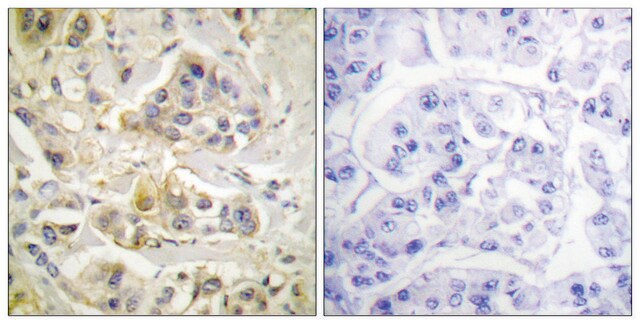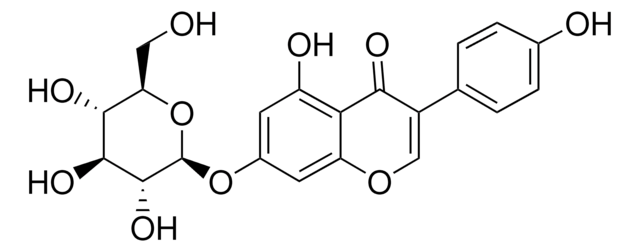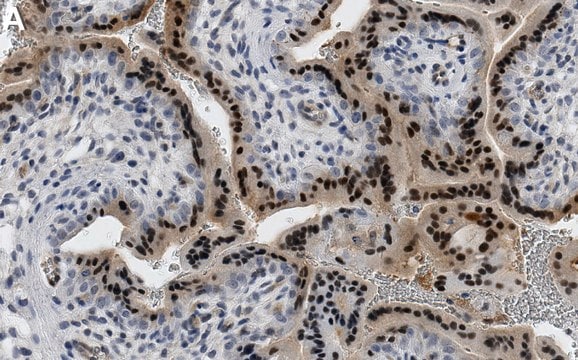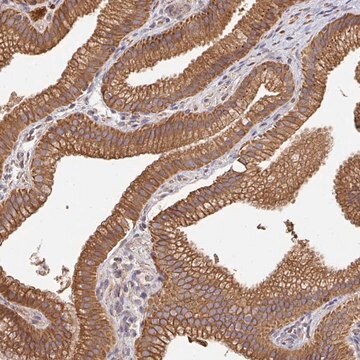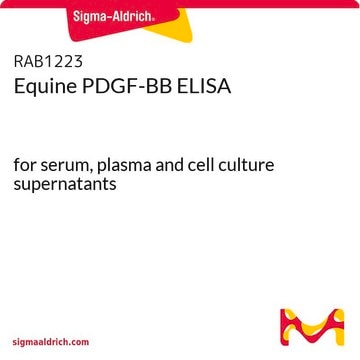SAB4700372
Monoclonal Anti-CD41-FITC antibody produced in mouse
clone MEM-06, purified immunoglobulin, buffered aqueous solution
Sinónimos:
Anti-ITGA2B-FITC, Anti-Platelet GPIIb
Iniciar sesiónpara Ver la Fijación de precios por contrato y de la organización
About This Item
UNSPSC Code:
12352203
NACRES:
NA.44
Productos recomendados
biological source
mouse
Quality Level
conjugate
FITC conjugate
antibody form
purified immunoglobulin
antibody product type
primary antibodies
clone
MEM-06, monoclonal
form
buffered aqueous solution
species reactivity
human
technique(s)
flow cytometry: suitable
isotype
IgG1
NCBI accession no.
UniProt accession no.
shipped in
wet ice
storage temp.
2-8°C
target post-translational modification
unmodified
Gene Information
human ... ITGA2B(3674)
General description
Cluster of differentiation 41 (CD41), also known as integrin subunit α 2b (ITGA2B) or GPIIb/IIIa (glycoprotein), is encoded by the gene mapped to human chromosome 17q21.31. It is a platelet-specific, surface membrane receptor.
The antibody MEM-06 reacts with CD41 (GPIIb), a transmembrane glycoprotein (integrin family) composed of two chains GPIIb alpha (heavy chain; 120 kDa) and GPIIb beta (light chain; 23 kDa). CD41 is mainly expressed on platelets and megakaryocytes.
Immunogen
Leukocytes of patient suffering from LGL-type leukaemia
Application
The reagent is designed for Flow Cytometry analysis of human blood cells using 20 μL reagent / 100 μL of whole blood or 1e6 cells in a suspension. The content of a vial (2 mL) is sufficient for 100 tests.
Biochem/physiol Actions
Cluster of differentiation 41 (CD41) is significantly involved in platelet adhesion and thrombus formation at the location of vascular injury. Fibrinogen and many extracellular matrix proteins bind in a groove between the α and β-subunits of the integrin receptor. Platelet aggregation, induced by the binding of fibrinogen to the ITGA2B receptor, is involved in the pathogenesis of acute thrombosis in coronary heart disease, stroke and peripheral arterial disease. CD41, expressed in haematopoietic progenitors, is associated with erythroid activity and endothelial marker expression. Single-nucleotide polymorphisms (SNPs) in CD41 might be associated with the risk of acute coronary syndrome and atherosclerosis.
Features and Benefits
Evaluate our antibodies with complete peace of mind. If the antibody does not perform in your application, we will issue a full credit or replacement antibody. Learn more.
Physical form
Solution in phosphate buffered saline containing 15 mM sodium azide and 0.2% high-grade protease free BSA as a stabilizing agent.
Disclaimer
Unless otherwise stated in our catalog or other company documentation accompanying the product(s), our products are intended for research use only and are not to be used for any other purpose, which includes but is not limited to, unauthorized commercial uses, in vitro diagnostic uses, ex vivo or in vivo therapeutic uses or any type of consumption or application to humans or animals.
¿No encuentra el producto adecuado?
Pruebe nuestro Herramienta de selección de productos.
Storage Class
10 - Combustible liquids
wgk_germany
WGK 2
flash_point_f
Not applicable
flash_point_c
Not applicable
Elija entre una de las versiones más recientes:
¿Ya tiene este producto?
Encuentre la documentación para los productos que ha comprado recientemente en la Biblioteca de documentos.
Identification of ITGA2B and ITGB3 Single-Nucleotide Polymorphisms and Their Influences on the Platelet Function.
Xiang Q
BioMed Research International (2016)
Vera Magistroni et al.
Haematologica, 104(9), 1789-1797 (2019-03-02)
Despite the advent of tyrosine kinase inhibitors, a proportion of chronic myeloid leukemia patients in chronic phase fail to respond to imatinib or to second-generation inhibitors and progress to blast crisis. Until now, improvements in the understanding of the molecular
β-Subunit Binding Is Sufficient for Ligands to Open the Integrin αIIbβ3 Headpiece.
Lin FY
The Journal of Biological Chemistry, 291, 4537-4546 (2016)
CD41 and CD45 expression marks the angioformative initiation of neovascularisation in human haemangioblastoma.
Ma D
Tumour Biology : the Journal of the International Society For Oncodevelopmental Biology and Medicine, 37, 3765-3774 (2016)
Nuestro equipo de científicos tiene experiencia en todas las áreas de investigación: Ciencias de la vida, Ciencia de los materiales, Síntesis química, Cromatografía, Analítica y muchas otras.
Póngase en contacto con el Servicio técnico